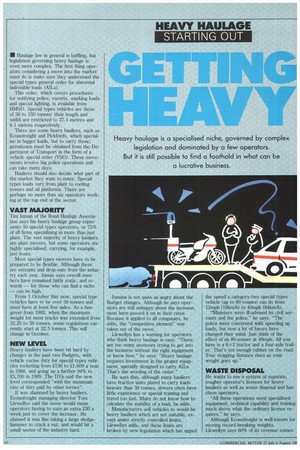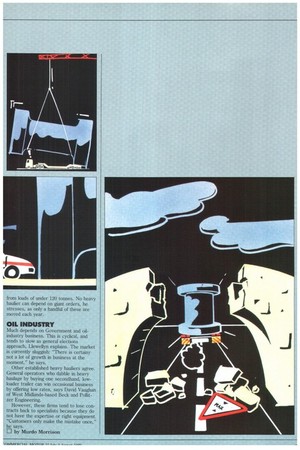• Haulage law in general is baffling, but legislation governing
Page 46

Page 47

If you've noticed an error in this article please click here to report it so we can fix it.
heavy haulage is even more complex. The first thing operators considering a move into the market must do is make sure they understand the special types general order for abnormal indivisible loads (AILs).
This order, which covers procedures for notifying police, escorts, marking loads and special lighting, is available from HMSO. Special types vehicles are those of 38 to 150 tonnes: their length and width are restricted to 27.4 metres and 6.1 metres respectively.
There are some heavy hauliers, such as Econofreight and Pickfords, which specialise in bigger loads, but to carry those, permission must be obtained from the Department of Transport in the form of a vehicle special order (VSO). These movements involve big police operations and can take many days.
Hauliers should also decide what part of the market they want to enter. Special types loads vary from plant to cooling towers and oil platforms. There are perhaps no more than six operators working at the top end of the sector.
VAST MAJORITY
Tim Inman of the Road Haulage Association says his heavy haulage group represents 50 special types operators, or 75% of all firms specialising in more than just plant. The vast majority of heavy hauliers are plant movers, but some operators are highly specialised, carrying, for example, just boats.
Most special types movers have to be prepared to be flexible. Although there are entrants and drop-outs from the industry each year, Inman says overall numbers have remained fairly static, and rewards — for those who can find a nicho — can be high.
From 1 October this year, special type vehicles have to be over 38 tonnes and must have at least five axles. As a hangover from 1983, when the maximum weight for most trucks was extended from 32.25 to 38 tonnes, some regulations currently start at 32.5 tonnes. This will change in October.
NEW LEVEL
Heavy hauliers have been hit hard by changes in the past two Budgets, with vehicle excise duty for special types vehicles rocketing from £130 to £1,600 a year in 1988, and going up a further 94% to £3,100 in 1989. The DTp said the new level corresponded "with the maximum rate of duty paid by other lorries".
It was slammed by heavy hauliers. Econofreight managing director Torn Llewellyn said the move would mean operators having to earn an extra £30 a week just to cover the increase. He claimed it was like taking a large sledgehammer to crack a nut, and would hit a small sector of the industry hard. Irimans is not quite as angry about the Budget changes. Although he says operators are still unhappy about the increase, most have passed it on in their rates. Because it applied to all companies, he adds, the "competitive element" was taken out of the move.
Llewellyn has a warning for operators who think heavy haulage is easy. "There are too many amateurs trying to get into the business without the right equipment or know how," he says. "Heavy haulage requires investment in the proper equipment, specially designed to carry AILs. That's the wording of the order."
lie says that, although many hauliers have tractive units plated to carry loads heavier than 38 tonnes, drivers often have little experience or special training and travel too fast. Many do not know how to calculate the stability of a load, he adds.
Manufacturers sell vehicles to would-be heavy hauliers which are not suitable, except under strictly controlled limits, Llewellyn adds, and these limits are broken by new legislation which has upped the speed a category-two special types vehicle (up to 80 tonnes) can do from 12mph (19km/h) to 40mph (64km/h).
"Ministers were ill-advised by civil servants and the police," he says. "The police were concerned with speeding up loads, but now a lot of forces have changed their mind. Just think of the effect of an 80-tonner at 40mph. All you have is a 6x2 tractor and a four-axle trailer. That's not enough rubber on the road. Your stopping distance rises as your weight goes up."
WASTE DISPOSAL
He wants to see a system of separate, tougher operator's licences for heavy hauliers as well as waste disposal and haschem operators.
"All these operations need specialised equipment, technical capability and training much above what the ordinary licence requires," he says.
Although Econofreight is well-known for moving record-breaking weights.
Llewellyn says 60% of its revenue comes from loads of under 120 tonnes. No heavy haulier can depend on giant orders, he stresses, as only a handful of these are moved each year.
OIL INDUSTRY
Much depends on Government and oilindustry business. This is cyclical, and tends to slow as general elections approach, Llewellyn explains. The market is currently sluggish: "There is certainy not a lot of growth in business at the moment," he says.
Other established heavy hauliers agree. General operators who dabble in heavy haulage by buying one secondhand, lowloader trailer can win occasional business by offering low rates, says David Vaughan of West Midlands-based Beck and Pollitzer Engineering.
However, these firms tend to lose contracts back to specialists because they do not have the expertise or right equipment. "Customers only make the mistake once," he says.
by Murdo Morrison




































































































































